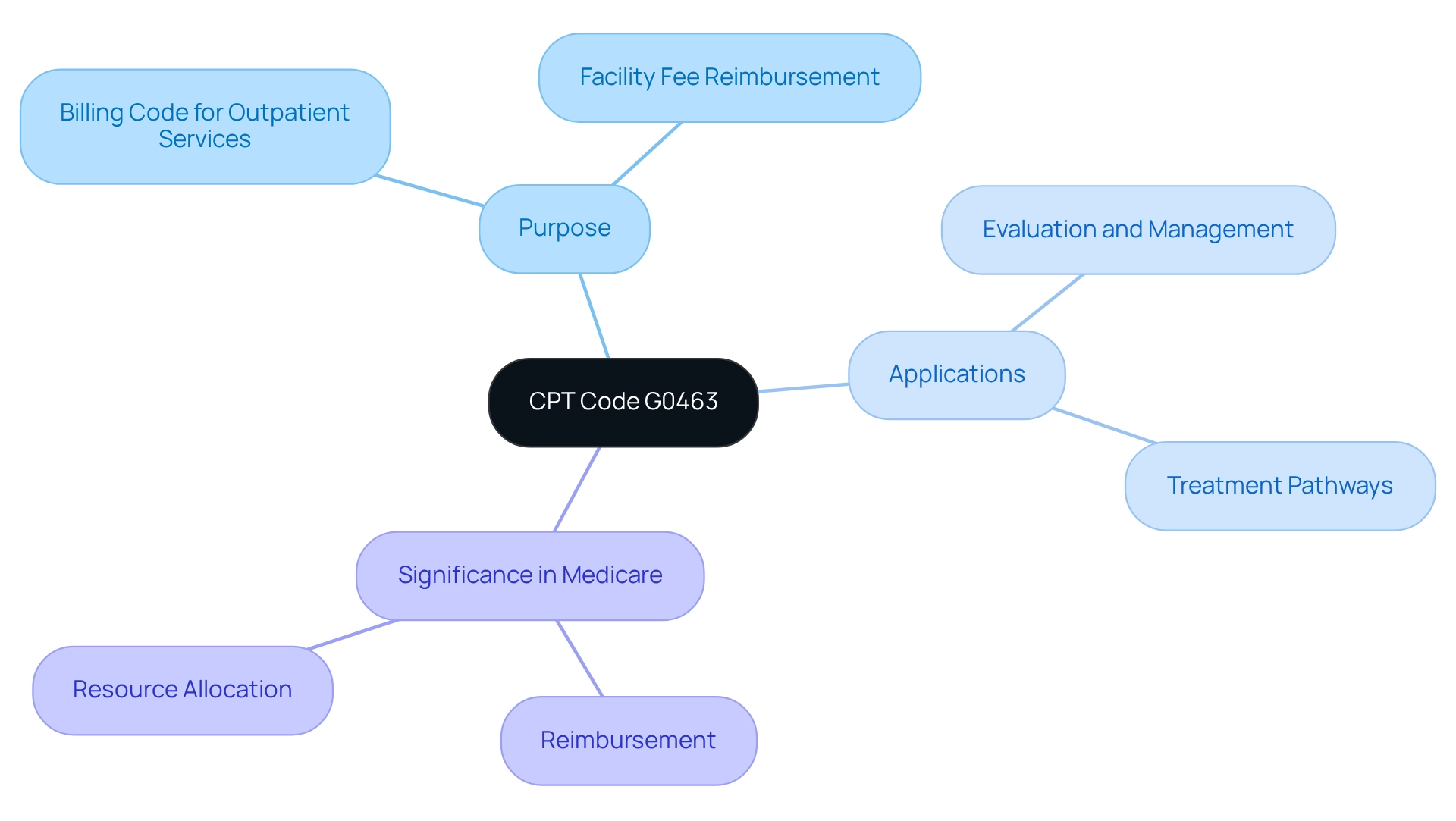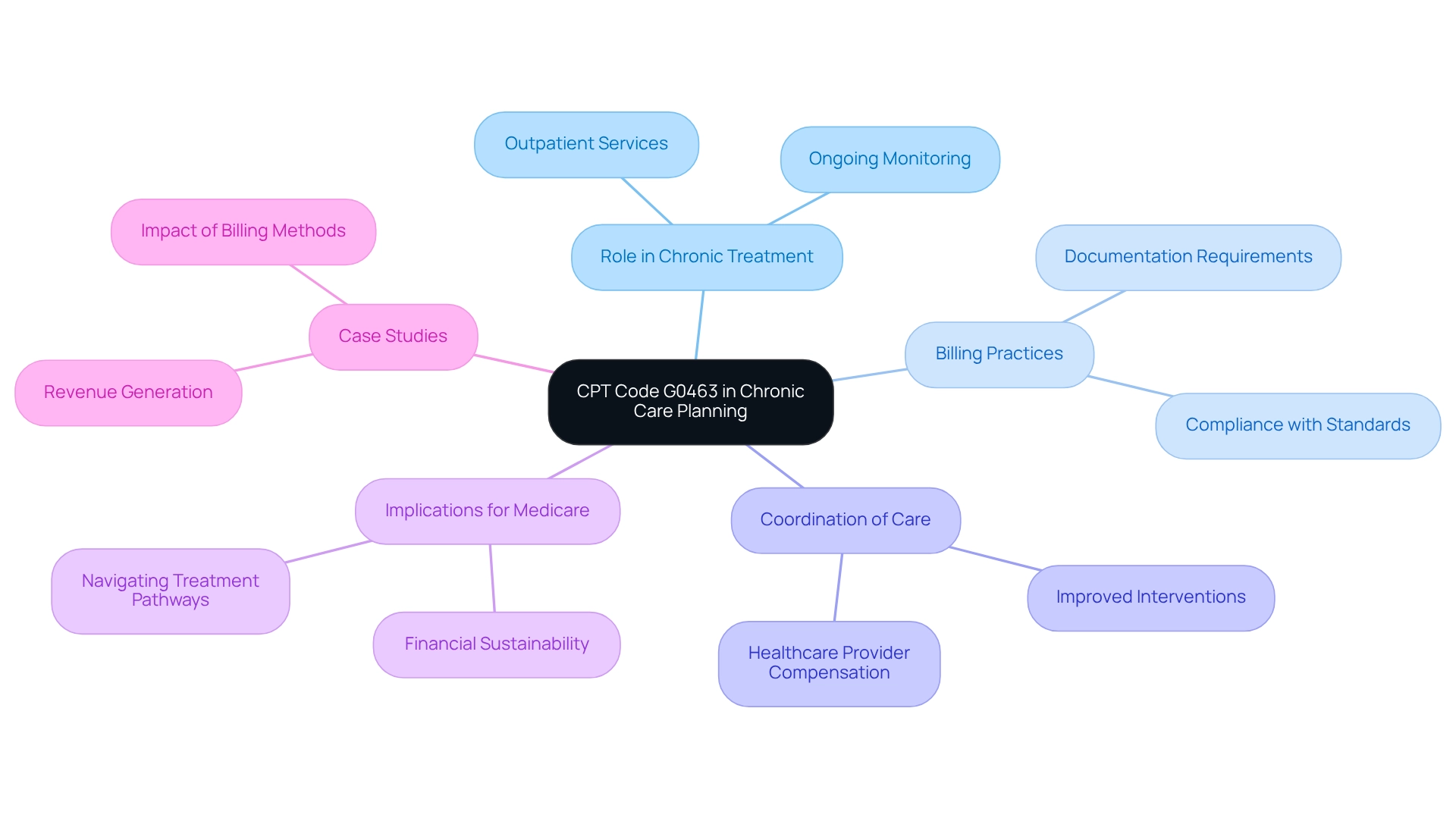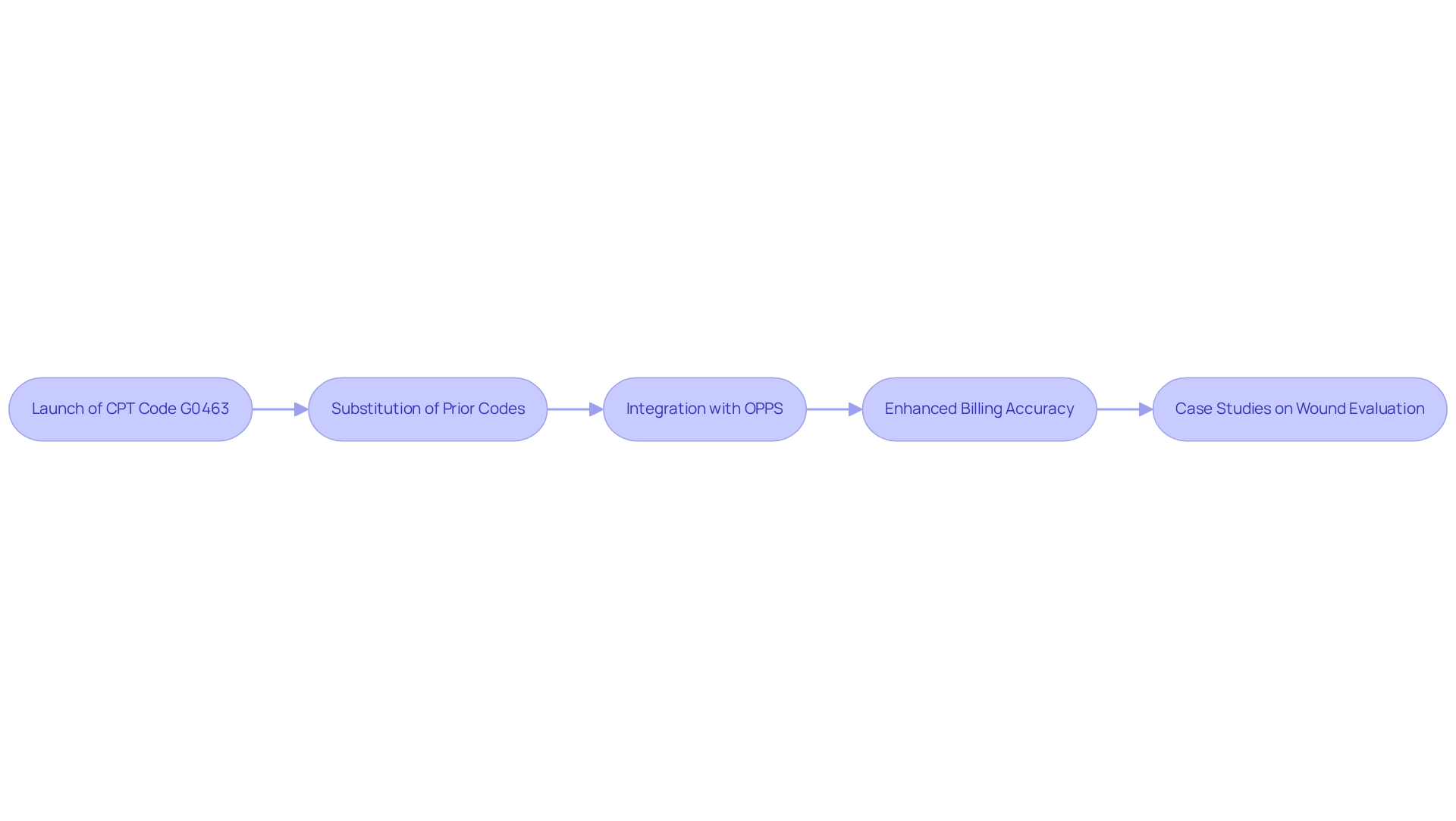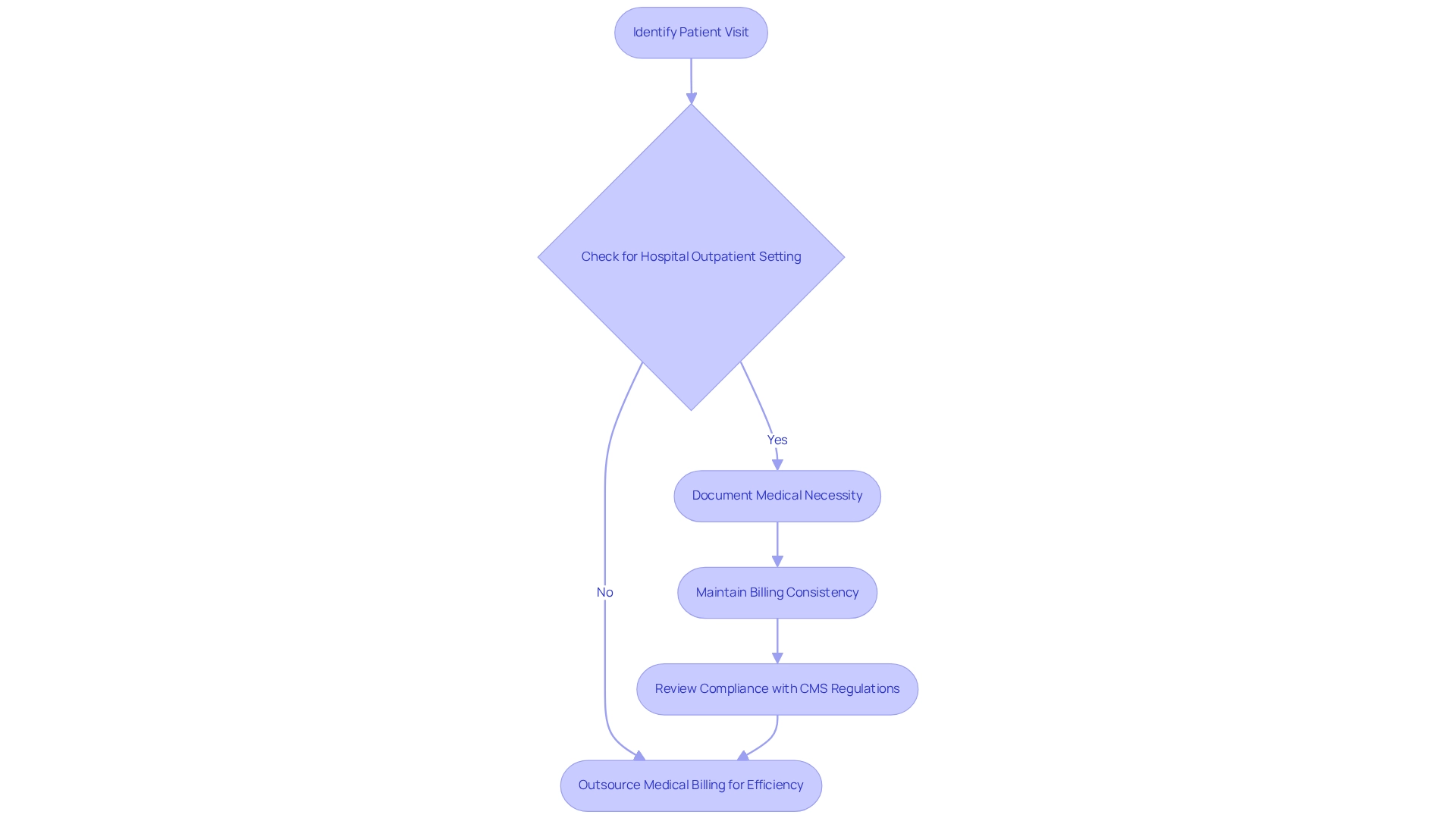Overview
CPT Code G0463 serves as a critical billing code for hospital outpatient clinic visits that encompass evaluation and management services. This code is primarily utilized to obtain reimbursement for facility fees linked to these outpatient services. Its importance is underscored in the context of chronic care management, where it ensures accurate billing and adherence to Medicare guidelines. By doing so, it enhances the financial sustainability of healthcare providers while simultaneously facilitating effective patient care.
Introduction
In the intricate landscape of healthcare billing, CPT Code G0463 stands out as a vital component for hospital outpatient clinic visits. This code not only facilitates the assessment and management of patients but also ensures appropriate reimbursement for services rendered. As chronic care management becomes increasingly essential, a comprehensive understanding of G0463’s role is paramount for healthcare providers navigating complex treatment pathways.
This article delves into the significance of this billing code, tracing its evolution and highlighting its impact on patient care, compliance, and financial viability within the healthcare system. By examining the characteristics and guidelines associated with G0463, stakeholders can better appreciate its critical role in enhancing chronic care planning and optimizing billing practices in a rapidly changing environment.
Define CPT Code G0463 and Its Purpose
CPT code G0463 serves as a vital billing code specifically designated for hospital outpatient clinic visits that encompass the evaluation and management of individuals. This code is essential for healthcare providers, as it enables them to bill for the facility fee associated with these outpatient services.
In the realm of Medicare, CPT code G0463 assumes a pivotal role in navigating treatment pathways, ensuring that hospitals can secure appropriate reimbursement for the resources and services rendered during outpatient visits. This is particularly critical for managing individual journeys from diagnosis through various lines of therapy, as it supports the financial aspects that are crucial for effective management and treatment approvals.

Contextualize G0463 in Chronic Care Planning
CPT Code is essential in chronic treatment planning, particularly for individuals dealing with multiple long-term conditions that require ongoing monitoring and management. This code enables healthcare providers to precisely record and charge for the comprehensive services provided during outpatient visits, which is vital in managing chronic conditions. Routine evaluations and adjustments to treatment strategies are crucial for efficient care, and this code supports this by promoting improved coordination of services. This guarantees that individuals receive prompt interventions while enabling healthcare providers to be fairly compensated for their efforts in handling complex health issues.
In the context of Medicare treatment pathways, the CPT Code G0463 plays a significant role in navigating the complexities of individual journeys from diagnosis to treatment. Statistics indicate that a notable percentage of individuals with multiple chronic conditions utilize outpatient services, underscoring the importance of effective billing practices. In 2025, the significance of CPT Code G0463 in chronic management continues to expand, as it not only aids in the documentation of services but also enhances the financial sustainability of chronic support. Practical instances show that healthcare professionals can enhance outcomes for individuals through organized chronic management strategies, ultimately resulting in improved health paths for those with intricate requirements.
Moreover, specialist insights emphasize that the strategic application of this approach can enhance chronic care planning, ensuring that healthcare professionals are prepared to address the needs of their patient groups effectively. Additionally, it is important to note that CPT Code G0463 is classified as an Evaluation and Management (E/M) code, which highlights the need for comprehensive management, assessment, and documentation practices, similar to those mandated for CPT Code 99214. Remaining compliant with claims processing standards is crucial for full reimbursement, further emphasizing the significance of correct billing practices in this context. Insights from the case study ‘Revenue Generation for Pharmacist Services’ illustrate how utilizing specific codes can greatly influence revenue generation, highlighting the financial advantages of efficient chronic condition management. Overall, the incorporation of these components highlights the vital function of this code in improving chronic care planning and management.

Trace the Origin and Evolution of CPT Code G0463
The Centers for Medicare & Medicaid Services (CMS) launched CPT Code G0463 on January 1, 2014, as part of an effort to simplify charges for outpatient clinic visits. This code substituted several prior codes utilized for outpatient services, merging them into a single designation to streamline the invoicing process. This change was integral to enhancing the efficiency of the Outpatient Prospective Payment System (OPPS), ensuring that hospitals could accurately bill for services rendered to Medicare beneficiaries by utilizing CPT Code G0463.
The launch of the new code represented a notable advancement in outpatient payment methods, illustrating the healthcare system’s continual adjustment to address evolving requirements. By offering CPT Code G0463 as a uniform code for the evaluation and management of individuals in outpatient environments, this procedure has enhanced invoicing precision and lessened administrative loads on healthcare professionals. This is particularly relevant in the context of navigating Medicare treatment pathways, where understanding the interplay of ICD, NDC, and HCPCS codes is crucial for effective patient management.
In CY 2014, new HCPCS codes were implemented for documenting medications, biologicals, and radiopharmaceuticals in the hospital outpatient environment, emphasizing the wider shifts in billing methods during the period of its introduction. Since its implementation, the adoption of CPT Code G0463 has been notable, with statistics indicating a steady increase in its use among outpatient facilities. This trend highlights the importance of CPT Code G0463 in enabling compliance and ensuring that providers can effectively capture the intricacies of healthcare, which is a key focus of CareSet’s comprehensive Medicare data analytics.
Practical instances demonstrate the effect of this code on charging methods. For instance, a case study on the evaluation and re-assessment of wounds emphasizes the importance of proper documentation in justifying additional evaluations and ensuring appropriate reimbursement. This situation emphasizes how the code has allowed providers to manage financial intricacies while upholding high standards of patient support. As Jim Strafford from CEDC mentions, ‘CMS may attempt to address this objection by assigning one ED HCPCS Level II for specified high acuity hospitals and educational institutions in the inner city,’ which further highlights the consequences of charging practices associated with this code.
Overall, the development of CPT Code G0463 signifies significant progress in outpatient invoicing, improving the accuracy of claims and assisting healthcare providers in delivering quality care to Medicare beneficiaries. CareSet’s insights into these invoicing practices and individual journeys are essential for pharmaceutical market access managers aiming to navigate the complexities of Medicare coverage and enhance outcomes for individuals.

Outline Key Characteristics and Billing Guidelines for G0463
The CPT code G0463 is specifically designated for hospital outpatient clinic visits, meaning it cannot be charged by independent clinics or private practices. This code encompasses all services provided during the visit, including evaluation and management activities. According to reimbursement guidelines, this code must be reported when an individual receives care in a hospital outpatient setting, and it is crucial that appropriate documentation substantiates the medical necessity of the services rendered.
Hospitals are required to maintain consistency in billing for this service across all patients, as mandated by CMS regulations. This compliance is vital, especially given that a significant percentage of hospitals encounter difficulties with adherence to the established guidelines. Understanding these requirements is essential for healthcare providers to prevent payment discrepancies and ensure accurate reimbursement.
Real-world examples underscore the importance of complying with G0463 payment guidelines. For instance, healthcare providers that outsource their medical billing can focus more on patient care while specialists manage the intricacies of invoicing, resulting in improved efficiency and increased revenue. Such strategies not only enhance adherence to payment guidelines but also contribute to the overall financial health of healthcare organizations.
Furthermore, CareSet integrates over 100 external data sources, providing comprehensive insights that aid in understanding and following compliance requirements. These insights empower healthcare stakeholders by offering a deeper comprehension of patient needs, provider networks, and pharmaceutical usage, which is critical for strategic healthcare decision-making. As noted by PCC Verdict, ‘CPT Code G0463 is classified as an Evaluation and Management (E/M) code,’ essential for its application in billing practices. Additionally, the January 2014 OPPS update introduced changes relevant to this specific code, highlighting the evolving landscape of reimbursement guidelines that healthcare providers must navigate. Statistics indicate that a notable percentage of hospitals do not comply with the CPT code G0463 billing guidelines, emphasizing the necessity for diligent adherence. The case study titled ‘Benefits of Outsourcing Medical Billing‘ illustrates how outsourcing can enhance efficiency and compliance, ultimately benefiting healthcare organizations.

Conclusion
Understanding the significance of CPT Code G0463 is crucial for healthcare providers engaged in chronic care management. This code serves as a cornerstone for billing hospital outpatient clinic visits, facilitating appropriate reimbursement for services that support patient assessment and ongoing management. The evolution of G0463 reflects a significant shift towards streamlined billing practices, enhancing both efficiency and accuracy within the healthcare system. As chronic conditions become increasingly prevalent, the role of G0463 in navigating treatment pathways and ensuring financial viability cannot be overstated.
The integration of G0463 into chronic care planning underscores its importance in enhancing patient outcomes through well-coordinated care. By allowing providers to document and bill for comprehensive services effectively, G0463 ensures that patients receive timely interventions and that healthcare providers are compensated for their critical efforts in managing complex health issues. The emphasis on compliance with billing guidelines highlights the need for healthcare organizations to adopt best practices, thereby avoiding discrepancies and maximizing financial health.
In summary, CPT Code G0463 transcends its role as merely a billing tool; it embodies the evolving landscape of healthcare delivery. As providers adapt to the increasing demands of chronic care management, leveraging G0463 effectively will be essential for optimizing patient care and ensuring sustainable financial practices. The future of outpatient care hinges on the ability to navigate these complexities, making a thorough understanding of G0463 vital for all stakeholders involved in patient management.


